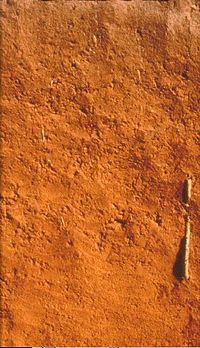Oxisols
| Oxisol | |
|---|---|

Oxisol profile
|
|
| Used in | USDA soil taxonomy |
| Profile | OABC |
| Key process | leaching, weathering |
| Climate | tropical |
Oxisols are an order in USDA soil taxonomy, best known for their occurrence in tropical rain forest, 15-25 degrees north and south of the Equator. They are classified as ferralsols in the World Reference Base for Soil Resources; some oxisols have been previously classified as laterite soils.
The main processes of soil formation of oxisols are weathering, humification and pedoturbation due to animals. These processes produce the characteristic soil profile. They are defined as soils containing at all depths no more than 10 percent weatherable minerals, and low cation exchange capacity. Oxisols are always a red or yellowish color, due to the high concentration of iron(III) and aluminium oxides and hydroxides. In addition they also contain quartz and kaolin, plus small amounts of other clay minerals and organic matter.
The word "oxisol" comes from "oxide" in reference to the dominance of oxide minerals such as bauxite. In the FAO soil classification, oxisols are known as ferralsols.
Scientists originally thought that the heavy vegetation of tropical rain forests would provide rich nutrients, but as rainfall passes through the litter on the forest floor the rain is acidified and leaches minerals from the above soil layers. This forces plants to get their nutrition from decaying litter as oxisols are quite infertile due to the lack of organic matter and the almost complete absence of soluble minerals leached by the wet and humid climate.
...
Wikipedia
